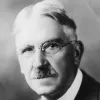That it is expedient to kill a king, rather than wait for his natural demise, is something a populace can come to accept, perhaps to relish. That the people’s own customs and costumes are to be radically changed by edict, rather than being allowed to evolve haphazardly and linger sentimentally beyond their time, is not. Yet messing with the national etiquette is one of the great spoils of revolutionary success.
Judith Martin (b. 1938) American author, journalist, etiquette expert [a.k.a. Miss Manners]
Star-Spangled Manners, Prologue (2003)
(Source)
Quotations about:
direction
Note not all quotations have been tagged, so Search may find additional quotes on this topic.
When we are working at a difficult task and strive after a good thing we fight a righteous battle, the direct reward of which is that we are kept from much evil.
It iz a darned sight eazier tew find six men who kan tell exactly how a thing ought tew be did than tew find one who will do it.
[It is a darned sight easier to find six men who can tell exactly how a thing ought to be done than to find one who will do it.]
Josh Billings (1818-1885) American humorist, aphorist [pseud. of Henry Wheeler Shaw]
Everybody’s Friend, Or; Josh Billing’s Encyclopedia and Proverbial Philosophy of Wit and Humor, ch. 130 “Affurisms: Puddin & Milk” (1874)
(Source)
When the whole world is running towards a cliff, he who is running in the opposite direction appears to have lost his mind.
Conscience is a man’s compass, and though the needle sometimes deviates, though one often perceives irregularities in directing one’s course after it, still one must try to follow its direction.
It may be prudent in me to act sometimes by other men’s reason; but I can think only by my own.
The author always loads his dice, but he must never let the reader see that he has done so.
W. Somerset Maugham (1874-1965) English novelist and playwright [William Somerset Maugham]
The Summing Up, ch. 59 (1938)
(Source)
On using plot to direct the reader's interest.
When vision fails
Direction is lost.When direction is lost
Purpose may be forgotten.When purpose is forgotten
Emotion rules alone.When emotion rules alone,
Destruction … destruction.
The first step — especially for young people with energy and drive and talent, but not money — the first step to controlling your world is to control your culture. To model and demonstrate the kind of world you demand to live in. To write the books. Make the music. Shoot the films. Paint the art.
A lot of companies — I know it sounds crazy — but a lot of companies … hire people to tell them what to do. We hire people to tell us what to do. We figure we’re paying them all this money; their job is to figure out what to do and tell us.
Steve Jobs (1955-2011) American computer inventor, entrepreneur
“Steve Jobs: ‘Computer Science Is A Liberal Art’,” interview with Terry Gross, Fresh Air, NPR (1996)
(Source)
There are a number of variants on this quotation. A common one: "It doesn't make sense to hire smart people and then tell them what to do; we hire smart people so they can tell us what to do."
One ship drives east and another drives west,
With the self-same winds that blow,
‘Tis the set of the sails
And not the gales
That tell them way to go.
Like the winds of the sea are the winds of fate,
As we journey along through life,
‘Tis the set of the soul,
That determines the goal,
And not the calm or the strife.Ella Wheeler Wilcox (1850-1919) American author, poet, temperance advocate, spiritualist
Poem (1913), “The Winds of Fate,” Poems of Optimism (1915)
(Source)
Sometimes called "'Tis the Set of the Sail."
There is a longer variant of the poem, sometimes called "One Ship Sails East," that includes two stanzas in front, and has slightly different words in the analogous stanzas. I have not found a primary source for this version:But to every mind there openeth,
A way, and way, and away,
A high soul climbs the highway,
And the low soul gropes the low,
And in between on the misty flats,
The rest drift to and fro.
But to every man there openeth,
A high way and a low,
And every mind decideth,
The way his soul shall go.
One ship sails East,
And another West,
By the self-same winds that blow,
'Tis the set of the sails
And not the gales,
That tells the way we go.
Like the winds of the sea
Are the waves of time,
As we journey along through life,
'Tis the set of the soul,
That determines the goal,
And not the calm or the strife.
All rising to a great place is by a winding stair.
Francis Bacon (1561-1626) English philosopher, scientist, author, statesman
“Of Great Place,” Essays, No. 11 (1625)
(Source)
He is aloof, as if his talk
Were priced beyond the purchasing;
But once his project is contrived,
The folk will want to say of it:
“Of course! We did it by ourselves!”Lao-tzu (604?-531? BC) Chinese philosopher, poet [also Lao-tse, Laozi]
The Way of Life, ch. 17 [tr. Blakney (1955)]
Alt. trans.:
- "A good manager is best when people barely know that he exists. Not so good when people obey and acclaim him. Worse when they despise him. But of a good leader, who talks little, when his work is done -- his aim fulfilled, they will say: 'We did it ourselves.'"
- "When the effective leader is finished with his work, the people say it happened naturally."
Children have more need of models than of critics.
[Les enfants ont plus besoin de modèles que de critiques.]
Joseph Joubert (1754-1824) French moralist, philosopher, essayist, poet
Pensées [Thoughts], ch. 19 “De l’Éducation [On Education],” ¶ 3 (1850 ed.) [tr. Calvert (1866), ch. 14]
(Source)
Sometimes attributed to Carolyn Coats.
(Source (French)). Alternate translations:Children have more need of models than of critics.
[tr. Attwell (1896), ¶ 261]Children need models rather than critics.
[tr. Lyttelton (1899), ch. 18, ¶ 1]Children. Need models more than critics.
[tr. Auster (1983), 1800 entry]
No individual or group will be judged by whether they come up to or fall short of some fixed result, but by the direction in which they are moving. The band mans is the man who no matter how good he has been is beginning to deteriorate, to grow less good. The good man in the man who no matter how morally unworthy he has been is moving to become better. Such a conception makes one severe in judging himself and humane in judging others.
John Dewey (1859-1952) American teacher and philosopher
Reconstruction in Philosophy, ch. 7 “Moral Reconstruction” (1919)
(Source)
All change is not growth; all movement is not forward.
Ellen Glasgow (1874-1945) American author
In Clifton Fadiman, I Believe: The Personal Philosophies of Certain Eminent Men and Women of Our Time (1939 ed.)
(Source)



















